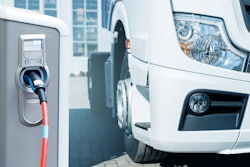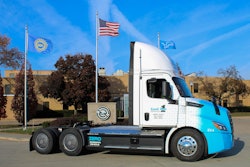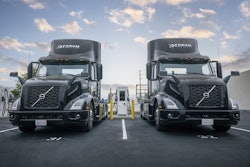Electric heavy trucks make up about 1% of the vehicle population, so there’s not tons of real-world data on how these trucks operate and what they can and can’t do. However, electric cars last year accounted for about 18% of all cars sold, up from 14% in 2022. The duty cycle is a lot different and so are the the use cases, but there are some lessons that can be learned from passenger cars when it comes to EV trucks.
Contents of this video
00:00 10-44 intro
00:25 Training technicians to service EV batteries
05:04 EV battery lifecycle
06:21 Repairing and remanufacturing batteries
08:55 Space for storing battery packs
10:58 Best practices for fleets and dealers
Speaker 1 (00:00):
CCJs 10 44 is brought to you by Chevron Delo, heavy duty diesel engine oil. Now there's even more reasons to choose Delo. What can electric trucking learn from passenger car EVs? You're watching CCJs 10 44, a weekly episode that brings you the latest trucking industry news and updates from the editors of CCJ. Don't forget to subscribe and hit the bell for notifications so you'll never miss an installment of 10 44. Hey everybody, welcome back. I'm Jason Cannon and my co-host. On the other side is Matt Cole. Electric heavy trucks make up, let's call it about 1%, just to make the math easy of the vehicle population. So there's not tons of real world data on these trucks and how they operate and what they can do and what they can't do.
Speaker 2 (00:44):
In 2023, electric cars accounted for about 18% of all cars sold up from 14% in 2022. The duty cycle is a lot different and so are the use cases, but there are some lessons that can be learned from passenger cars when it comes to EV trucks.
Speaker 3 (00:58):
The training is always a big deal. We talked to our automotive friends about the training needed, finding people that have that trade and have that skill specific to EV batteries, specific to batteries. I think having techs that can do that work is something like it's very, in other discussions, it's very aligned with diesel techs. Diesel techs are highly sought off after they're very niche. It's almost the same for EV batteries. And so as the commercial truck sector gets into EVs more and more, I think having a service option for if a battery does fail that somebody can work on them so these trucks can go somewhere. Do you have a battery replaced on top of that? I think more about my growing pans are, and I say mine, but on working with an OEM as an extension of them is often like parts management considering all of the things that a ice vehicle, how they would trace a transmission.
(02:06):
And I'm using transmission as an example. Where we often have seen a lot of congruency with our OEMs is they like to use a transmission as something likewise of a battery. I think the traceability of batteries is something that is very unique. We have our own software and house that we built from the ground up to trace batteries throughout the production line, logistics tests on a battery. And I think on top of that is we have done some work, we've supported a bus, EV bus which is large and required multiple battery packs to power the full item. And where I'm going with this is that you often got into a very elaborate distribution process and supply chain process because the batteries were kitted. So basically you kit the batteries and assign them to the vin, right? So you know what batteries are with what vin, but if you have nine batteries per truck or something like that, the traceability becomes very, very important, especially for down the line for serviceability.
(03:13):
And I guess it can all back up to in production when the trucks are being built and EV batteries are being put into or batteries are being put into trucks if there's multiple of 'em. Is there traceability to say these batteries are in this VIN to support the service side later on down the road? The traceability outside of just knowing where something is from a transportation realm like a tracking number and such and location. I think there's really, what I mean is if you have the serial number of the battery, we link everything to that serial number and that includes battery health data tests that we run on batteries, reasons for failure failed and past tests. So over time you build up this massive amounts of data over time that supports OEMs and supports manufacturers on improving battery technology. And that's kind of where we live is we are the masters at learning a battery system and then uncovering what could have gone wrong with it.
(04:14):
And then on top of that, understanding if there's any alignment with these failures or any consistencies amongst these failures. Is it based on climate? Are we seeing certain DTCs or air codes in this location in the United States? Why is that? Batteries, I always used to always like to say batteries are these living and breathing things. They're almost like good sitting on a shelf. They're almost like groceries sitting on a shelf. They have a life, right? And you have to meter that life and track that life and state of health over time. And that's kind of where I'm going with the traceability side is that transmission often you kind of went off mileage and I'm a huge motor sports nut, so I love motorsport and know that in the automotive world a lot of it's built around mileage or hours spent, but batteries is just a little different.
Speaker 1 (05:04):
One of the misnomers of electric vehicles is that cell phone mentality that when the battery goes bad you're just out of luck and you've got to throw the entire thing away. Bryce says that's not the case because there's an entire battery lifecycle once it's removed from the vehicle.
Speaker 3 (05:18):
Much of the world has always thought that once the battery dies there's nothing else left in it, right? There's a lot of fear of these batteries ending up potentially in scrap yards or areas that are difficult to get to and what does that mean for the environment and all these other things. A lot of these lithium-ion batteries, these advanced battery packs have the ability to either be repaired in some instances, module repairs and example of that swapping out modules that are bad for good modules so you can basically regain the health of the battery pack. And then now as recycling becomes way more pronouns in the world, there's a lot of recyclers out there, us being one of them, a bunch of different processes for recycling and can get very convoluted. But the goal there is to when a battery is bad, there's a lot of incentive now to get the battery back to be recycled and try to get those rare materials that much of the world is looking for right now in mining and all of that.
Speaker 2 (06:21):
Batteries can in some cases be repaired or remanufactured a concept that this industry is already familiar with.
Speaker 3 (06:27):
There's a multitude of repairs that can happen and usually, I guess I can explain how our business operates is that we work with the world's largest OEM automotive manufacturers and they often come to us with a scenario and we learn from them what repairs and reman opportunities there are for a battery. Some of those are what you could call intrusive repairs, maybe opening up. We never go to, right now we're not going to cell level, which means that you would cut actual welds on a actual cell of a battery, but we are opening up the larger battery pack or section, potentially do repairs to it. These things can be like harnesses. These things can be temperature sensors that run maybe inside the battery pack all the way to what was mentioned, a repair of modules. Sometimes there's not much that can be done to the battery pack other than swapping out modules and there can be hundreds of modules per battery pack.
(07:31):
And so if you identify one bad module, the battery pack's usually only as good as that weakest module. And so we have the ability to swap out those modules. And I think where we could get into even more conversation is the safety around doing that. And the reason why we're so in the loop with automotive manufacturers right now and dealerships and such is that these battery packs are very high voltage, some of 'em 800 volts plus. And so you are running into potential issues with arc flash. You're wearing arc flash gear to do these module repairs. So there's a lot of safety involved as well when doing the repair.
Speaker 1 (08:08):
Dealers will be an even bigger part of a fleet's operation once or if the entire industry goes full battery electric because they'll have to manage most of the truck's useful life. But that doesn't come without challenges and Bryce tells us what those are after a word from 10 44 sponsor chevron lubricants.
Speaker 4 (08:26):
We serve customers from Birmingham, Alabama to the Gulf Coast, so our people and our trucks are booked solid all day. There is no slack in our schedules. These trucks can't break down. I choose an engine oil that takes care of the number one issue with our engines emissions, so we don't have to worry about DPF clogging. I choose the engine oil that keeps our trucks hauling. I choose DELO 600 A DF,
Speaker 3 (08:55):
Some battery packs that are 4,000 pounds plus in a crate and these are dealerships receiving these. They're same dealers that are often just doing oil changes and now they're removing a 2000 pound battery from a crate. So I think from a supply chain perspective, there's a lot that we're doing to support those things and I think it can get even more interesting as you get commercial in there because of how big the battery packs could be. ev battery repairs, we already talked about the training, doing EV battery repairs quickly, dealers function and maintain their business on getting cars in and out. So feasibility of repairs, making batteries easier to repair is something that we've seen happen over the years. Initially in the business isn't always easy to repair a module, which is why the battery has to come to us. We do now have the opportunity to go onsite at dealers to help them through a repair process to help train them.
(09:59):
And so that's interesting. And then on top of that, we also touched on the space needed for dealers and the safety considerations around storing battery packs potentially for even if it's a few days, do they have the space to store something that's quite large that is maybe abnormally large, almost the size of a small car? So I think the space, the storage ability for dealers is something that is changing. I think dealers also don't have docks, a lot of them, and so you are right on with the supply chain complexities of that too. When this 4,000 pound crate and batteries show up now, the dealer may even need a forklift. A lot of them don't have that size of forklift, so a lot of change going on. I think it is a opportunity for a lot of dealers to potentially differentiate if they are hopping on the EV train to acquire some unique equipment alongside their OEM partner and really differentiate themselves from the past. I guess
Speaker 2 (10:58):
There are some best practices fleets and dealers should be prepared to deploy when they do elect wait and to be EVs that can help extend the life of the batteries and the truck.
Speaker 3 (11:07):
If you can maintain the charge of your battery throughout the day, that's what helps your battery maintain its health. So I believe it's maintaining a charge of anywhere between 70 to a hundred percent or something like that. Don't ever let the battery fully degrade over time and let it sit at a very low SOC and vice versa. Things like that are helpful. The amount of times that you fast charge are something that we obviously look at for battery health data, user behavior, is this person driving all day almost to zero and then in fast charging every day, or are they just running to the grocery store and then charging a few volts daily? Exactly right. There's some thought that that can lead to battery degradation. So ultimately I think we're still figuring it out. I don't think I have the, personally, I don't have the best answer, but I think what we consider are things like don't leave a battery out in the elements.
(12:04):
We're often dealing with a battery or in my world with the logistics portion of what I oversee, we're dealing with a dealership who has removed a battery that needed to replace a battery and a lot of those dealers may not have space for those batteries and so they end up maybe having to put it outside and so you actually have a risk of health there of a battery, especially if it's being stored outside where it's hot cold, it's getting rained on and it's in a crate, potentially a wooden crate. So all of those things are being also looked at with the battery outside of the car.
Speaker 1 (12:37):
That's it for this week's 10 44. You can read more on ccj digital.com. While you're there, sign up for our newsletter and stay up to date on the latest in trucking industry news and trends. If you have any questions or feedback, please let us know in the comments below. Don't forget to subscribe and hit the bell for notifications so you can catch us again next week.










